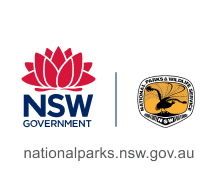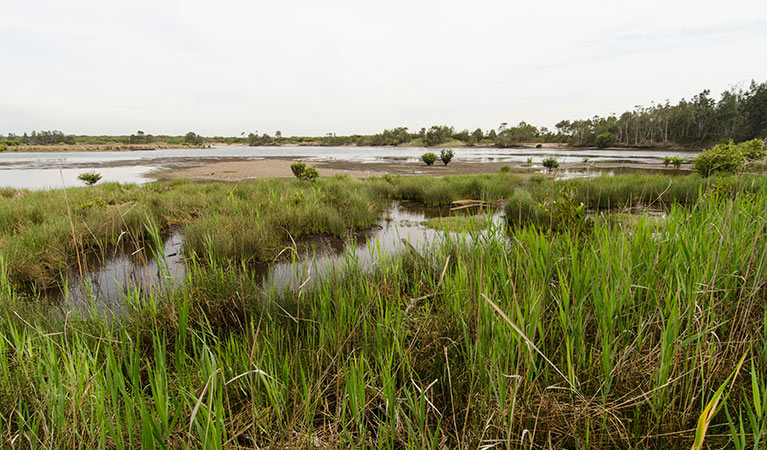School excursion
Ecosystems at risk at Towra Point Nature Reserve
Towra Point Nature Reserve
Open, check current alerts
Overview
Senior students will hone their fieldwork skills in this Stage 6 (Years 11-12) geography excursion at Towra Point Nature Reserve. This Ramsar-listed wetland is the largest and most botanically diverse estuarine wetland remaining in the Sydney region.
Read more about Ecosystems at risk at Towra Point Nature Reserve
The wetland at Towra Point is an ideal location for students to study a vulnerable ecosystem at risk.
Students will learn about the historical uses of this site and the impacts nearby Botany Bay has had on the wetlands over time. We'll discuss why this site holds international significance and protection.
We'll examine the mangrove environment up close, so please be prepared to get muddy and wet.
Students will discuss the current management plans in place to protect this fragile ecosystem, and how these may be strengthened over time.
For program outline, safety and practical information about this excursion, see info for teachers
| Stage | Stage 6 (Years 11-12) |
|---|---|
| Learning area | Geography |
| Student outcomes |
GE-11-01. Examines places, environments and natural and human phenomena, for their characteristics, spatial patterns, interactions and changes over time GE-11-02. Explains geographical processes and influences, at a range of scales, that form and transform places and environments GE-11-03. Explains geographical opportunities and challenges, and varying perspectives and responses GE-11-04. Assesses responses and management strategies, at a range of scales, for sustainability GE-11-06. Identifies geographical methods used in geographical inquiry and their relevance in the contemporary world GE-11-07. Applies geographical inquiry skills and tools, including spatial technologies, fieldwork and ethical practices, to investigate places and environments GE-11-09. Communicates and applies geographical understanding, using geographical knowledge, concepts, terms and tools, in appropriate forms GE-12-01. Analyses rural and urban places, ecosystems, global biodiversity and economic activity, for their characteristics, spatial patterns, interactions, and nature and extent of change over time GE-12-02. Analyses geographical processes and influences, at a range of scales, that form and transform places and environments GE-12-03. Assesses geographical opportunities and challenges, and the role of varying perspectives and responses in their management GE-12-04. Evaluates responses and management strategies, at a range of scales, for sustainability GE-12-06. Justifies geographical methods used in geographical inquiry and their relevance in the contemporary world GE-12-07. Selects and applies geographical inquiry skills and tools, including spatial technologies, fieldwork and ethical practices, to investigate places and environments GE-12-09. Communicates and applies geographical understanding, using geographical knowledge, concepts, terms and tools, in appropriate forms |
| Objectives |
Students will:
|
Excursion details
- When
Weekdays during school term.
- Availability
- Guided. Available on request.
- Duration
- 4-5 hr
- Grading
- Medium. Guided activities along a track and some long grass, through water in a mangrove area and on a beach. No climbing is involved. Insect repellant advised.
- Price
-
$20 per student for groups of 25 or more. GST included. For smaller groups conditions apply.
- Accessibility
- No wheelchair access
- Meeting point
- Meet at Cronulla Wastewater Treatment Plant carpark, Captain Cook Drive, Cronulla
- Equipment
provided - Yes. All equipment is provided.
- Booking
- If you would like to organise a NPWS school excursion please get in touch with local staff or use the 'Enquire' link for the online form.
Local alerts
For the latest updates on fires, closures and other alerts in this area, see https://www.nationalparks.nsw.gov.au/education/stage-6-geography-ecosystems-at-risk-towra-point-nature-reserve/local-alerts
Operated by
- School excursion inquiries - Sydney South
- 02 9542 0615
- npws.royalguidedtours@environment.nsw.gov.au
- PO Box 144, Audley NSW 2232
Park info
- in Towra Point Nature Reserve in the Sydney and surrounds region
This reserve is closed to the public with the exception of Quibray Bay viewing platform and Towra Spit Beach. Quibray Bay viewing platform is accessible from Captain Cook Drive. Towra Spit Beach is accessible via marine vessel, with 5 available moorings.
Info for teachers
All the practical information you need to know about Ecosystems at risk at Towra Point Nature Reserve.
Program outline
- Welcome, acknowledgement of Country and safety talk
- Examine the human impact caused by horse stables and identify weeds
- Morning tea and toilet break
- Walk through the reserve, noting changes to the physical environment.
- Conduct a transect in a saltmarsh area
- Identify grey mangrove adaptations
- Measure abiotic factors in the saltmarsh area
- Stop at Weedy Pond to identify significant plants and their adaptations
- Lunch at Silver Beach
- Discuss current issues and ecosystem management at Towra Point Nature Reserve
- Recap and farewell
Getting there and parking
Towra Point Nature Reserve is located on Captain Cook Drive at Kurnell. Students will be met at the Cronulla Wastewater Treatment Plant carpark on Captain Cook Drive, Cronulla.
What to bring
Please wear fully enclosed shoes and bring a hat, sunscreen, wet weather gear, and lunch which should be low waste with a refillable water bottle. Students should bring gear in a backpack or similar (not plastic bags). Please note: Insect repelland is strongly advised. Wear a pair of shoes that can get wet and bring a change of shoes/socks and a small towel. Students should bring a clipboard, worksheets, pens and pencils.
Maps and downloads
Risk assessment and risk benefits
Our rangers and guides have the technical skill and experience to assess the risks and the benefits of a variety of activities delivered as part of our learning programs.
We believe in including opportunities that allow students to learn and experience for themselves through exploration in the natural environment.
Please make your own risk assessment based on the information provided. Detailed potential risks and controls are provided for the site to assist teachers in risk management planning. Teachers and carers should be aware of, and consider the needs, abilities and medical conditions of students when visiting this site. The supervision of students remains the responsibility of the teacher. The school must ensure an adequate number of adult supervisors are present.
Accessibility
Disability access level - no wheelchair access
There is no wheelchair access; if you have someone with special needs, please let us know in advance so that we can plan accordingly.

